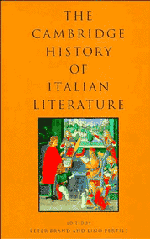Book contents
- Frontmatter
- Origins and Duecento
- The Trecento
- The Quattrocento
- The Cinquecento
- The Seicento: Poetry, Philosophy and Science
- 15 The Baroque
- 16 Lyric poetry
- 17 Mock-epic poetry and satire
- 18 Treatises
- Narrative prose and theatre
- The Settecento
- The Age of Romanticism (1800–1870)
- The Literature of United Italy (1870–1910)
- The Rise and Fall of Fascism (1910–45)
- The Aftermath of the Second World War (1945–56)
- Contemporary Italy (since 1956)
- Bibliography
- References
17 - Mock-epic poetry and satire
from The Seicento: Poetry, Philosophy and Science
Published online by Cambridge University Press: 28 March 2008
- Frontmatter
- Origins and Duecento
- The Trecento
- The Quattrocento
- The Cinquecento
- The Seicento: Poetry, Philosophy and Science
- 15 The Baroque
- 16 Lyric poetry
- 17 Mock-epic poetry and satire
- 18 Treatises
- Narrative prose and theatre
- The Settecento
- The Age of Romanticism (1800–1870)
- The Literature of United Italy (1870–1910)
- The Rise and Fall of Fascism (1910–45)
- The Aftermath of the Second World War (1945–56)
- Contemporary Italy (since 1956)
- Bibliography
- References
Summary
Heroi-comic poems
Epic poetry, which was so important in the previous century, declined in the Baroque period when heroic ideals had not only waned but were openly ridiculed (one need only think of Don Quixote or of Scarron's Roman comique). In Italy this anti-heroic attitude gave rise to a series of mock-epic poems. The first, and certainly the greatest, of these is La secchia rapita (‘The Stolen Bucket’) by Alessandro Tassoni (1565–1635). After studying law, Tassoni followed the iter typical of many scholars of the time, serving princes and cardinals, and visiting various Italian and European courts. His Dieci libri di pensieri diversi (‘Ten Books of Diverse Thoughts’, 1620) contains observations, meditations and paradoxical statements on all sorts of topics; but the most interesting part is the last, in which Tassoni attacks ancient authors in favour of modern ones. His strong anti-traditionalist statements precede the famous ‘querelle des anciens et des modernes’ by many decades. This polemical vein inspired his Considerazioni sulle rime del Petrarca (1611) in which he attacks the principle of imitation adopted by the petrarchisti, whom he blames for decadence in poetry. From this polemical and irreverent background came La secchia rapita. Written between 1614 and 1615 – but published in Paris in 1622, and then, in a revised version, in Venice in 1630 – this poem in twelve cantos recounts the war between the Guelfs of Bologna and the Ghibellines of Modena over a bucket which the Modenese stole from their enemies.
- Type
- Chapter
- Information
- The Cambridge History of Italian Literature , pp. 310 - 311Publisher: Cambridge University PressPrint publication year: 1997

